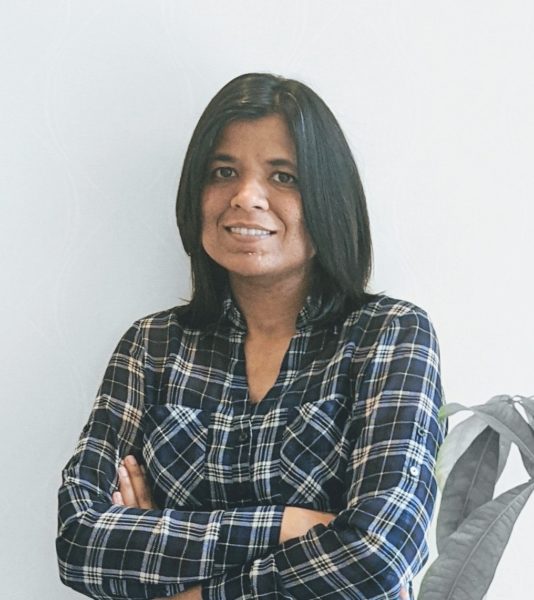
By Evan Phillips
This month we are featuring Dr. Shivani Garg, a Senior Scientist at the local biotechnology company LanzaTech (www.lanzatech.com). Dr. Garg is a biochemist by training and a tenacious leader passionate about carbon recycling and sustainability. I had the opportunity to speak with her last month and learn about her interests.
It was during her final years of high school that Dr.
Garg became enamored with biochemistry:
“I found it very interesting how we can
go from very simple molecules to complicated molecules with these biochemical reactions.
There was a direct analogy for me going from organic chemistry which was all
catalyst-based to going to biochemistry that was biocatalyst-based. The entire
world of biocatalysis, science, and enzymological reactions intrigued me a lot,
and I ended up doing a PhD in biochemistry. That is how I found my passion for
biochemistry. It is akin to solving a puzzle, going from molecule A to molecule
X through a series of biochemical reactions.”
Having completed a Bachelor of Engineering at UIET, Panjab University, it was her blossoming interest in biochemistry that brought her to Iowa State University where she worked with Dr. Basil Nikolau. Dr. Nikolau’s management style, mentorship, and also his scientific endeavors were inspirational to her. In fact, with his support, Dr. Garg had the amazing opportunity to start her own company, OmegaChea Biorenewables LLC. The company grew out of her PhD research and time in the Iowa State Entrepreneurship Program at Center for Biorenewable Chemicals (CBiRC). Speaking of Dr. Garg as a student building a company while still doing a PhD, Dr. Nikolau said, “These start-up activities broaden her experience, make her more interesting as a scientist, and increase her motivation to succeed in research.” (https://cen.acs.org/articles/91/i43/Students-Start-Ups-Biorenewability.html?h=-1014651617). Creating bio-based lubricants from sugars was the first scientific goal of the company. After the completion of her PhD, Dr. Garg’s company extended its research to engineer E. coli that produce specialized fatty acids that could be used for this same purpose. “I worked on it for a few years. Like most start-ups, OmegaChea did not survive for long, but left me with a huge learning experience. One of the biggest learnings was that a technology may be really cool, and you may be passionate about it, but it won’t sell unless it solves a real problem or addresses a pain point of your customers. Scalability and economic viability are also critical to the success of a start-up.”
Asked about the frustrations of scientific research, Dr. Garg reinforced many students’ feelings about it: “There are more failures than successes. Sometimes we just have to walk away and return with a fresh perspective or apply a different approach.” This inevitability has never deterred her. She credits her parents for instilling a strong work ethic in her and supporting her interests. “Having gone through these experiences [graduate school and start-up company], I feel confident about tackling any problems in my professional and personal life.”
Dr. Garg expanded on her biochemistry experience next at Rice University where she engineered methane utilizing bacteria to make fuels and chemicals Here she also learned about Illinois-based LanzaTech, which has pioneered recycling of waste carbon into ethanol. This was a clear match—an innovative technology to help solve a global problem. Speaking about climate change, Dr. Garg did not mince words: “It hurts me that we now use this phrase—climate change—which used to be referred to as global warming. There was this whole politicization of the issue. We have taken more than our share from this planet than we have given back. I want to help in whatever ways I can to give back to the planet” Indeed, Dr. Garg struck me as someone who also walks the walk to promote environmental change and reduce her own carbon footprint. Specifically, she has made a conscious effort not to bring plastic into her home and to slowly take away the items that do contain plastic by finding more sustainable materials.
Since 2018, Dr. Garg has worked on engineering Clostridium bacteria at LanzaTech. Instead of relying on sugars, the novel approach is to rely on waste gases. “We’re tapping into the catalytic potential of the bacteria and the idea is to use waste gases that contain carbon dioxide, carbon monoxide, and hydrogen. This gas mix is fed to LanzaTech’s proprietary bacteria to make fuels such as ethanol. My role is to engineer these bacteria to make a diverse range of products. These products derived via carbon recycling can replace petroleum-derived chemicals. That has a direct impact on this problem of climate change. If we can capture those emissions and reuse, recycle them we are creating a dent in the fossil carbon economy.” As remarkable as this sounded, I wondered how scalable this technology could be: “We have two commercial plants operating today in China, using industrial emissions to make ethanol and we have six other plants in various stages of design and construction globally, all using different feedstocks from steel mill process emissions to gasified agricultural resides.”
Asked for any secrets to her career success, Dr. Garg stressed three key elements: working hard, perseverance, and patience. What is most compelling about Dr. Garg’s career though is her passion and the recognition of it: “Follow your heart.”
